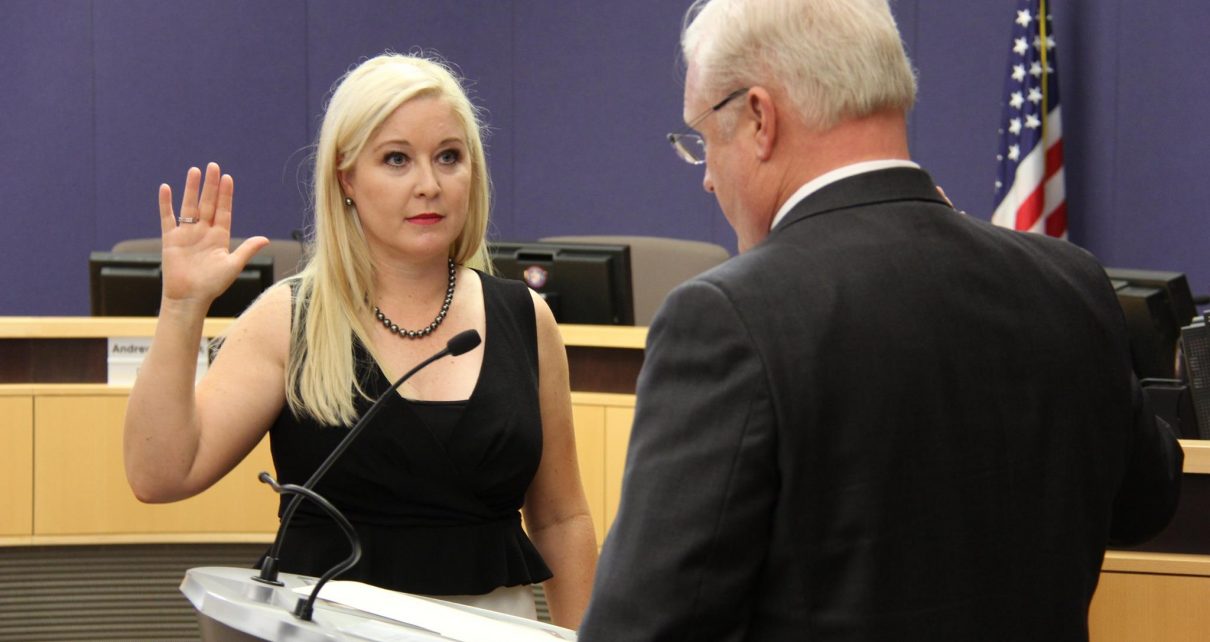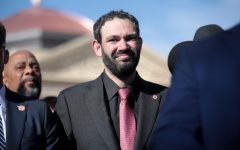
The Honorable Jennifer Ryan-Touhill recites the oath of office at her investiture ceremony in the Board of Supervisors Auditorium in Phoenix, AZ. (Photo: Superior Court)
AFEC Wins Election Free Speech Challenge
Judge rules that Fontes violated first amendment rights
By Steve Kirwan, August 14, 2024 5:00 am
On Tuesday, August 6, 2024, Maricopa County Super Court judge Jennifer Ryan-Touhill ruled in favor of the Arizona Free Enterprise Club’s (AFEC) challenge to Secretary of State Adrian Fontes’ language in Arizona’s 2023 Elections Procedures Manual (EPM). The ruling found that Fontes violated the Arizona Constitution by attempting to limit free speech rights. She reasoned that the EPM’s language and the limits therein were “unnecessary, vague, overbroad, and serving as universal prohibition on conduct.” She further deemed that the EPM contained “misstatements and modifications of statutes and failures to identify distinctions between guidance and legal mandates.”
Her ruling stated, “The EPM’s language has restricted what the Secretary finds acceptable regarding behavior, both speech and acts. Our state constitution guarantees a right to speak freely and is only restricted for an abuse of that right.”
It continued, “[M]any of the prohibitions listed in the EPM are free speech and protected by both the Arizona Constitution and the U.S. Constitution. What, for example, constitutes a person communicating about voter fraud in a harassing manner? Or, for that matter, ‘posting’ a sign in an intimidating manner? How does a person either do this behavior — whatever it means — or avoid it? And what content printed on a t-shirt might be offensive or harassing to one and not another? What if the t-shirt says, ‘I have a bomb and I intend to vote!’? Where does the Secretary draw the line?”
The ruling identified 13 specific examples of what Judge Ryan-Touhill called “problematic language” in the EPM, with several clearly representing subjective determinations:
- [N]o electioneering may take place outside the 75-foot limit if it is audible from a location inside the door to the voting location.
- Any activity by a person with the intent or effect of [ ] harassing, [ ] (or conspiring with others to do so) inside or outside the 75-foot limit at a voting location is prohibited.
- The officer in charge of elections has a responsibility to train poll workers and establish policies to prevent and promptly remedy any instances of voter intimidation.
- The officer in charge of elections should publicize and/or implement the following guidelines as applicable:
- The inspector must utilize the marshal to preserve order and remove disruptive persons from the voting location.
- Openly carrying a firearm outside the 75-foot limit may also constitute unlawful voter intimidation, depending on the context.
- Aggressive behavior, such as raising one’s voice or taunting a voter or poll worker.
- Using [ ] insulting [ ] or offensive language to a voter or poll worker. Disrupting voting lines.
- Following voters or poll workers coming to or leaving a voting location, including to or from their vehicles.
- Intentionally disseminating false or misleading information at a voting location. . . .
- Directly confronting, questioning, photographing, or videotaping voters or poll workers in a harassing [ ] manner, including when the voter or poll worker is coming to or leaving the polling location.
- Asking voters for “documentation” or other questions that only poll workers should perform.
- Raising repeated frivolous voter challenges to poll workers without any good faith basis, or raising voter challenges based on race, ethnicity, national origin, language, religion or disability.
- Posting signs or communicating messages about penalties for “voter fraud” in a harassing or intimidating manner.
Her ruling deemed that Fontes incorrectly interpreted Arizona’s anti-voter intimidation laws by, among other things, assigning criminal intent based on subjective ideology.
“The Secretary has no authority to change a mens rea, regardless of the objective of the language,” stated Ryan-Touhill. “Moreover, neither law allows for a subjective belief of the alleged target of the crime but rather focuses upon the acts of the criminal (e.g., force, violence, infliction) or the victim (‘a reasonable person’).”
In a press release issued after the ruling, AFEC President Scot Mussi expressed his satisfaction that the court recognized Arizona coitizens’ First Amendment rights. “The judge correctly realized that certain portions of Secretary Fontes’ illegal and radical manual were nothing more than a brazen attempt to destroy the integrity and transparency of state elections,” Mussi wrote. “Secretary Fontes and his team of leftwing ideologues must conform the entire manual to state law as is their statutory duty.”
Although her decision deemed that the sections of the EPM containing illegal speech restrictions are unenforceable, it is unclear whether the EPM will be corrected or rewritten in time for the November 2024 election.
- Bolick Animal Cruelty Bill Passes Legislature Despite GOP Concerns - June 25, 2025
- Montenegro Declines to Comment on Lack of Ethics Complaints - May 30, 2025
- Honoring the Sacrifice: A Reflection on Memorial Day - May 26, 2025




